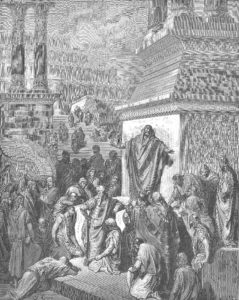Have you ever thought it would be pretty cool to be a prophet of God in Israel?
Think about it.
Out of all people, you were one of the ones especially chosen to be placed on a mission for the Almighty and as a result would receive all the divine perks connected to your prophetic office.
What kind of divine perks am I talking about?
Well, for starters, how about supernatural power to heal the sick and raise the dead?
Or heck, how about the divine privilege of being able to skip death itself just like Elijah did when he was whisked away by a cloud into the heavens?
It sounds like it would be pretty darn awesome to be a prophet of God, doesn’t it?
Well, perish the thought.
The reality is being a true prophet of God was fraught with worry, danger and quite far removed from any cool super hero or super power ideas you may have fantasized about.
Even the greatest of the prophets such as Isaiah and Jeremiah who have books of the Bible named after them were always worried if they should really tell the people what God had told them.
They sometimes even had doubts if what had actually entered their minds was of divine origin or not?
Was the message they had received really from God or just their imaginations gone doggone hog wild?
Here’s the thing.
Even the greatest of Prophets were keenly aware that just because they had been chosen by God didn’t necessarily mean they were incapable of making a mistake.
It just meant the Lord was incapable of making a mistake.
So, here’s one truth you should burn into your brain.
Each and every one of God’s prophets were by definition RELUCTANT prophets.
They weren’t scanning the career boards for prophet jobs and when God called them out, they weren’t too excited about it.
Look at how Moses responded when God called on him..
“Who am I that I should go to Pharaoh and bring the Israelites out of Egypt?”
-Exodus 3:11
And even after God reassured Moses through supernatural signs that everything was going to be okay, Moses responded as follows…
“Pardon your servant, Lord. Please send someone else.”
-Exodus 4:13
Or take a look at the very opening verses of the Book of Jonah when God called him to preach against the wickedness of the city of Nineveh.
“The word of the Lord came to Jonah son of Amittai: ‘Go to the great city of Nineveh and preach against it, because its wickedness has come up before me. But Jonah ran away from the Lord and headed for Tarshish. He went down to Joppa, where he found a ship bound for that port. After paying the fare, he went aboard and sailed for Tarshish to flee from the Lord.”-Jonah 1:1-3
As we can see, even the greatest prophets of God were filled with doubts and insecurity EVEN if they knew the message they had received was undoubtedly from God.
I can understand their feelings because prophets were often beaten, jailed and martyred or at the very least led very difficult and lonely lives while they resided on this planet.
The idea of getting married, having children, working a ridiculous cozy 9-to-5 job and then retiring with a nice huge lump sum of money in the bank was simply not an option open to them.
They were pretty much social pariahs.
And why?
Because more often than not, the messages they brought were NOT what the people wanted to hear.
The cliche saying that people always want to kill the messenger of unwelcome news holds very true here.
Here’s another important point to consider.
Prophets had a much keener awareness and understanding of God’s sovereignty than your average person.
They understood very well that if the people didn’t respond to God’s message with repentance and a change in behavior, they were toast.
In addition, the prophets were also aware that it was the Lord who determined whether the people had properly repented or not.
The Prophet didn’t make that decision.
The story of Jonah is a good case in point here.
Jonah was actually concerned that the people of Nineveh might take the Lord’s ultimatum to heart, repent and thus avoid the destruction that was originally prophesied on them.
Jonah was afraid that if his prophecy of destruction didn’t occur, he would be seen as a false prophet.
If that happened, at best he would be outcast from his own people and at worst he would be executed for being a false prophet.
He was so worried about this happening that he tried his best to flee from God and the Lord ended up having to take the extreme measure of having him swallowed whole by a whale to get Jonah to comply with His command.
So just get this.
All of the anxiety and trouble that Jonah faced was NOT an exception when it came to God’s prophets.
It was the norm.
While being a Prophet of God is a great and honorable office, it is fraught with many dangers and severe isolation.
Heck, even Jeremiah was called the “Weeping Prophet” if that gives you any idea of how tough it can be.
I’ve said this before and I’ll say it again.
If you feel like you want to be a Prophet (and if you’re a gentile, forget it), you’re NOT qualified.
Period.
The one commonality that seems to exist among ALL the Biblical prophets without exception was that they did NOT want to become a prophet.
NEXT TIME WE BEGIN DEUTERONOMY CHAPTER NINETEEN




Leave a Reply